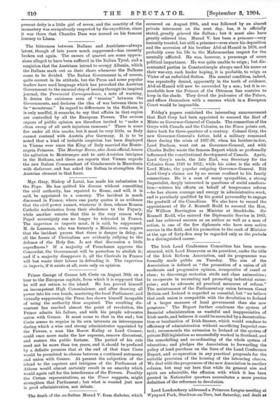Friday's papers contained the interesting announcement that Earl Grey had
been appointed to succeed the Earl of Minto as Governor-General of Canada. The connection of the Greys with Canada and the Colonies, as the Times points out, dates back for three-quarters of a century. Colonel Grey, the new Governor-General's father, held a military command there during the crisis of 1837-39, when his brother-in-law, Lord Durham, went out as Governor-General, and with Charles Buller wrote the famous Report which so profoundly influenced the constitutional development of Canada. Again, Lord Grey's uncle, the late Earl, was Secretary for the Colonies from 1848 to 1852; while his sister is the wife of Lord Minto, the popular outgoing Governor-General. Bfit Lord Grey's claims are by no means confined to his family connections. He is a man of many sympathies, a strong Imperialist, deeply interested in questions of social ameliora- tion—witness his efforts on behalf of temperance reform —he has shown courage and energy in administrative twork, and is peculiarly qualified by his genial personality to engage the goodwill of the Canadians. We also have to record the appointment of Sir j. Rennell Rodd to succeed the Hon. Sir William Barrington as Minister at Stockholm. Sir Rennell Rodd, who entered the Diplomatic Service in 1883, and has achieved success as an author as well as a man of action, is one of the few diplomats who have seen active service in the field, and his promotion to the rank of Minister at the age of forty-five may be regarded only as the prelude to a distinguished career.






































 Previous page
Previous page